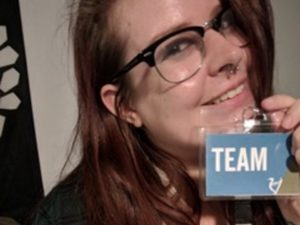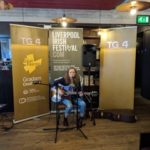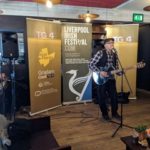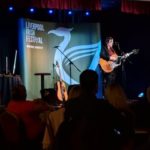
Each year, the Liverpool Irish Festival recruits a team of volunteers.
They are the lifeblood of the festival. They help audiences feel welcome, share the story of the festival and build a community that values arts, culture and Irishness. Occasionally, we design roles specifically for someone who comes to us with an area of work they’d like to try out.
In 2018, ‘Missourian’ Anna Adelman approached us for an internship. Instead, she became an invaluable member of the team, who embodies the famous (but uncreditable) quote: “Volunteers are not paid not because they are worthless, but because they are priceless. Asked to reflect on her experience, Anna wrote the following, which we thought we should share (like a proud parent!)!
I’ve always been the kind of person to send unsolicited emails to people. I figure there’s really only three outcomes:
- They respond and say yes to whatever I’m asking and its great
- They respond, say no, and we both forget about it and move on, or
- They don’t respond and we both forget about it and move on.
There is really no downside.
So, in the summer of 2018 I was back home in Kansas City and realized while I’ve done this to set up meetings with people I admire, I’ve never used this as an approach to get professional experience. I had just graduated from the Music, Theatre, and Entertainment Management course at The Liverpool Institute for Performing Arts (LIPA) and was looking for some real festival management experience. I decided to shoot my shot and emailed Emma, the Festival Director here at Liverpool Irish Festival.
After graduating, all I knew was that I didn’t know what I wanted to do in life. I knew I wanted to do something in [the] entertainment business and I knew I loved to learn. Because of these very open-ended things, I decided to expand my festival and event experience. Working in events and festivals is a bit weird because, if you’re like me, you might have worked in them for three or four years, but have never been involved in the planning process. So, I set out to get some insight into how a festival comes to be.
Before working at the Liverpool Irish Festival, I was always limited by either my university schedule, visa restrictions or general timing. I couldn’t help plan festivals at home in Kansas City because during the planning stage I was at university in Liverpool; I couldn’t get a job at Liverpool festivals such as Sound City or Threshold because -with my visa- I can only work a certain number of hours per week. There were a few opportunities that made it past those first two barriers, but I had piling university assessments I needed to prioritize. Some of these factors limited me somewhat with the Liverpool Irish Festival in the sense that I couldn’t make it to every event because of classes and assessments, and I couldn’t help with planning before September because I was busy with dissertation writing, graduation, and then I went back to Kansas City for a little bit. However, I do not believe these infringed upon my overall learning experience too much.
In short, the Liverpool Irish Festival aims to bring the Irish culture straight to Liverpool. Delivered through various events such as concerts, spoken word, art installations, comedy shows, films and beer festivals this is the time to learn about Irish cultures, subcultures and heritage. It is also a great place for Irish expats to reconnect with their roots. The 2018 program had a wide array of events ranging from music, to theatre, to art, to live podcasts, to family days. It really is a cultural event and not a specialized music festival, as many Irish Festivals tend to be.
A few weeks after the initial email I was back in Liverpool to start my master’s degree in Management and I had my first sit down with Emma to talk over both of our expectations for my work experience. This was a little different because I was not there to fulfill a university module or credit, I was there purely to learn on my own volition. Over a Skype call during the summer we agreed that I could take on the role of Volunteer Coordinator (the most official sounding title I’ve ever had – I was very excited about that). Basically, my job was to help recruit and induct volunteers, act as a point of contact for them, create the schedule around their availability as well as for a few board members, and just generally help around at events during the festival.
One thing I was nervous about going in was while I had experience working at festivals (particularly Irish festivals), I did not have experience managing people. I didn’t know if I was any good at facilitating and problem solving when other people are involved. This was a great opportunity to try my hand at it seeing as Emma had been incredibly supportive and I knew if I ran into any trouble or had any questions, she would be able to help. However, something I was challenged by was getting a grasp on the responsibility I was given. In my previous roles in festivals, I was only ever responsible for small details. With the festival here, I was suddenly in a role with not only a greater amount of responsibility, but more to prove.
I was always thrown by festival attendees asking me questions about the festival that only a staff member would know and found a large number of people seemed impressed by my title and the sense of authority that came with it. While it was all well and good to be able to proudly say “Hi, I’m Anna, I am the volunteer coordinator for the festival here”, I felt the need to follow that up and prove that I am not just a twenty something with a fancy title and nothing else. You know what they say, with great power comes great responsibility. While that is probably just my own problem, it felt very highlighted by the public nature of this role, and by the obvious fact I am not Irish, nor am I even English.
It turns out I didn’t need to manage the volunteers much. They were a great group of people who really didn’t need much direction. I told them how to talk about the feedback forms and where to direct audience members if they have any questions, and that was about it. During the festival, my time was spent filling in the gaps in the volunteer schedule, learning how to set up a very basic sound system and answering emails. To a lot of people that might not sound like the most fun a 22-year-old can have, but for me it was amazing. The biggest thing I learned throughout this experience was if you trust yourself, go with the process, make sure you know what you’re talking about and do your research, you’ll be fine. More specifically, I learned how to communicate with a group of very different people I had never met before.
I believe that communication is a key competency for anything in the management world, and university projects really limit improving that in the sense that you are always working with people you know, so you know how to communicate with them and you know their work ethic. A goal I set for myself with Emma back in September was to be more proactive in my work in how I connect and manage other people. As I said earlier, that is something I went in with absolutely no idea how to do, but left the festival feeling about a million times more confident in.


 Anna’s images of Karen Turley and Mark Vormawah at the Everyman TG4 Playalong sessions and Cathy Cook at the Liverpool Irish Centre LIF2018 festival Launch.
Anna’s images of Karen Turley and Mark Vormawah at the Everyman TG4 Playalong sessions and Cathy Cook at the Liverpool Irish Centre LIF2018 festival Launch.
Throughout the whole process Emma really made sure I had a great experience; from introducing me to just about everyone she could find, to working around my ever-changing university schedule [and] inviting me to my first “staff” Christmas party. If I had to decide, my top three program highlights (in no particular order) were The Guilty Feminist podcast, The Morning After the Life Before and the launch night.
I really loved the humor of The Guilty Feminist and how relatable it was. I have actually kept up with it and it is now part of my regular routine. The Morning After the Life Before was a hard-hitting piece about legalizing same-sex marriage in Ireland and I cried about four times during the show. The launch night of the festival made my top three moments because of the sense of community. Before that, I had met Emma, the volunteers, and briefly the board members, so I went in not really knowing many people. By the end of the night it felt kind of like a warm hug. Everyone was happy to be there, eating stew and getting a sneak peek of the talent from the coming week.
After the festival ended, I helped input the feedback forms, had a nice Christmas break, and then badgered Emma to let me help out more. Just two months with the festival wasn’t enough for me. Working with Liverpool Irish Festival was a very rewarding experience and I will definitely miss it next year. If you are available to, please volunteer for the 2019 festival! It is such a fun time and you’ll meet some great people. In general, volunteer duties are:
- to be there to answer questions attendees might have
- hand out feedback forms and explain how they work and how their data will be kept confidential
- report problems to either myself, [the venue], or Emma
- and just generally be a smiling face for people to see and associate with the festival.
It is a very hands on role and shifts only ever last as long as the show you are signed up for (and sometimes not even that long). In exchange for this, you get free entry to the shows you are assigned, a great position to put on your CV, experience working in fields you may not have worked in before and any other opportunity you create for yourself. For example, you may have seen the blog post made by a volunteer this year named Beth Stevens. She turned her volunteer time into a personalized experience and really made the most of it.
Working with the Liverpool Irish Festival team was unforgettable. I learned some really valuable skills I can take forward with me. While I still don’t know for sure what career path I’ll take, I know that I can use what I learned from the festival. I can apply the communication to pretty much anything in life, I am so much more organized than I used to be and just from observation I learned how to lead a successful event while maintaining a happy work force.
It kind of feels that many people in the entertainment industry have been worn down by the demands of the business and have been made into a pessimist, but Emma proves that you really don’t need to resort to that. Until now I have just accepted negative attitudes as […a] characteristic of the entertainment industry, but from learning that is not that case, I can carry that forward with me and maybe start to change the perception of the entertainment industry. But for now, I’ll just keep learning and trying to figure out what’s next. AA
We would like to say thank you to Anna for her amazing work, volunteer coordination, positivity and adaptability. We hope that with us, you will wish her all the very best for the completion of her Masters!
